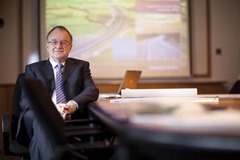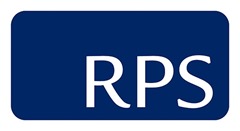The road to Aarhus: sustainable infrastructure
 PJ Rudden, Director of Energy and Environment at RPS Group, emphasises the need to involve communities when planning Ireland’s new wave of energy projects.
PJ Rudden, Director of Energy and Environment at RPS Group, emphasises the need to involve communities when planning Ireland’s new wave of energy projects.
The geographic scale of infrastructure projects in Ireland has increased significantly over the past year. To power the next energy generation in Ireland for instance, we now require infrastructure over wider spatial areas and landscapes. We also need a greater public awareness of the need to decarbonise our energy system to make it more environmentally sustainable. The recent storms and other weather extremes are clear evidence that the climate around us is changing. We therefore must adapt and mitigate our lives and our approach to projects. Never before were we so challenged and never before had we such an opportunity to outline our vision for a carbon free environment.
Yet while most people accept ‘why’ we have to have a cleaner, more energy efficient way of powering our future, there is a greater human challenge to gain acceptance of the ‘how’ and the ‘where’, especially if we live close to one of these new energy creations bringing lower carbon power. It requires a quantum leap in our imagination to accept a greater density of infrastructure as acceptable features on our landscape.
Our grandfathers and grandmothers possibly thought the same of rural electrification but did not have the learning nor the voice nor the means to proper information to counter what they may have seen as dangerous incursions in the name of progress. Indeed, we haven’t had such a confluence of new energy projects in Ireland for decades across the regions and it will take some time for people to get used to this intensity of energy endeavour now under way.
We have got to accept that the only way in communications terms to build a new national infrastructure is through dialogue. Communications exercises by infrastructure providers have to be open, honest and respectful. It is very much the case of “Tell me – and I will forget” … “Show me – and I will remember” but “Involve me – and I will understand.” We need to involve people in the process from the start when they see the study area only on a map and no threatening lines but a positive engagement on the power needs of a nation finally recovering from recession. What policies are currently guiding our infrastructural development and are they reasonable?
Ireland finally ratified the Aarhus Convention on public participation in decision making in 2012 and it became effective in Irish law in 2013. This new EU and thus Irish law gives rights of information, rights of participation and judicial review to citizens on projects before they enter the planning process i.e. in the non-statutory phase of consultation.
It recognises that every person has a right to live in an environment adequate to his or her health or well-being. That needs to be publicly stated and acknowledged at the start of the project but it is also never too late to say it, even when a later confrontation with residents may arise and needs to be resolved.
At the start of projects, the ‘road to Aarhus’ is not easy, quick nor inexpensive, but if implemented properly will save overall public communications costs on the project or indeed may end up saving the project entirely from total failure.
 RPS
RPS
West Pier Business Campus
Dun Laoghaire
Co. Dublin
T: +353 1 488 2900
E: pj.rudden@rpsgroup.com





